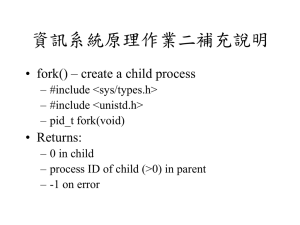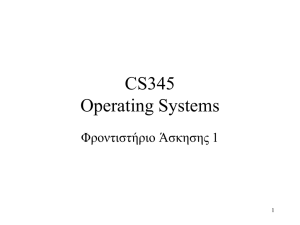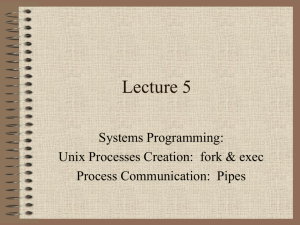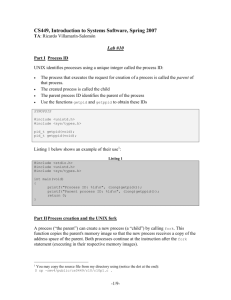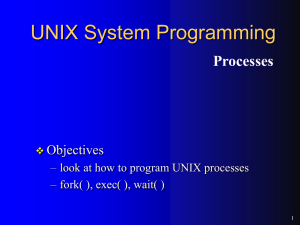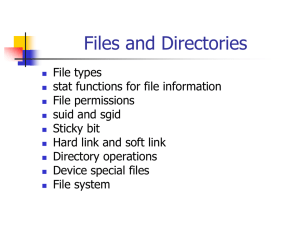Process Control
advertisement
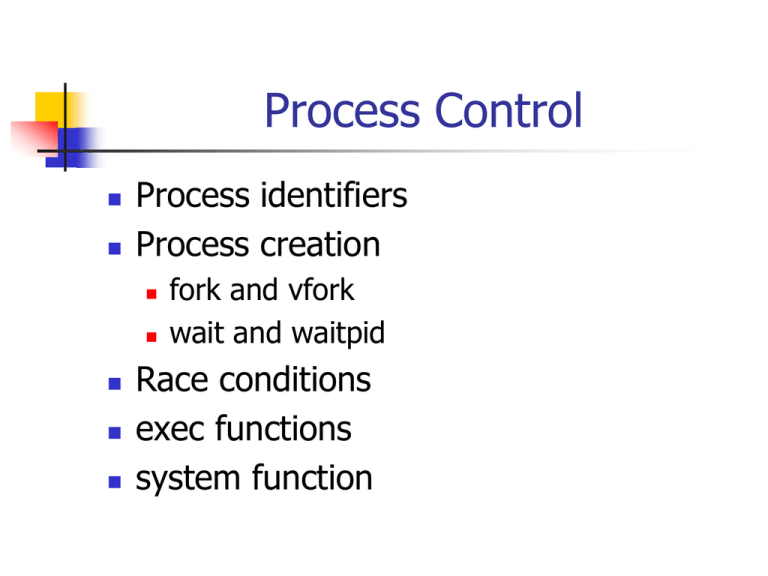
Process Control Process identifiers Process creation fork and vfork wait and waitpid Race conditions exec functions system function Process Identifiers Every process has a PID Unique non negative integer PIDs are re-used Two special PIDs 0 – scheduler process. A.K.A. swapper. System process. 1 – init process. Parent of all other processes. Process Identifiers Functions pid_t getpid(void); pid_t getppid(void); uid_t getuid(void); uid_t geteuid(void); gid_t getgid(void); gid_t getegid(void); Shell command ps Process Creation fork function Used to create new processes Every process except swapper and init are created with fork pid_t fork(void); Creates a copy of the current process Returns 0 in the child Returns the PID of the child in the parent Returns -1 on error Process Creation Child process gets a copy of the parent’s data space, heap and stack Text segment is shared Modern implementations use copy-onwrite for data because a fork is often followed by an exec Buffering and forking Buffers are part of the data of the parent and will be copied to the child Line buffered vs fully buffered are flushed at different times May cause output of program to differ if its re-directed to a file instead of screen (changes from line buffered to fully buffered) File Sharing File descriptors are copied from parent to child Important that file offsets changed by child are updated for parent as well See Fig. 8.2 on page 214 Normally the parent will wait on the child to finish or close the descriptors that the child will use (and child closes the ones parent will use) Inherited Properties RUID RGID EUID EGID Supplementary GIDs Process Group ID Session ID Controlling terminal set-user-ID and set-group-ID flags Current working directory Root directory File mode creation mask Signal mask and dispositions close-on-exec flag for any open file descriptors Environment Attached shared memory segment Memory mappings Resource limits Differences Return value from fork Process IDs Different parent process IDs Child’s tms_utime tms_stime tms_cutime and tms_cstime values are zero File locks not inherited Pending alarms cleared for child Pending signals for child set to empty set When fork fails Too many processes in the system Too many processes for the real user ID CHILD_MAX specifies the max number of processes per user vfork Creates a new processes with the express purpose of exec-ing a new program New child process runs in parent’s address space until exec or exit is called vfork guarantees that the child will run before the parent until exec or exit call is reached exit functions Normal termination Return from main Calling exit Calling _exit or _Exit Abnormal termination Calling abort Receiving some signals exit functions Special cases Orphaned process If the parent of a process terminates before it does, that process becomes an orphan init becomes the parent of all orphaned processes Zombie process Child terminates, but parent has not yet called the wait or waitpid function to retrieve its exit status Status of zombie processes shown as “Z” by the ps command init always calls wait or waitpid for its children, so orphaned processes never become zombies wait and waitpid pid_t wait(int *status); pid_t waitpid(pid_t pid, int *status, int options); Both return the PID of the child or -1 on error status will hold the return status of the child when the function returns. wait and waitpid 4 mutually exclusive macros for interpreting the status argument WIFEXITED(status) WIFSIGNALED(status) WTERMSIG(status) WCOREDUMP(status) WIFSTOPPED(status) WEXITSTATUS(status) WSTOPSIG(status) WIFCONTINUED(status) wait and waitpid options argument specifies the behavior of the parent. Can be zero or binary OR of the following constants WNOHANG – do not block for child to terminate. Function returns zero in this case WUNTRACED – retrieves the status information for the process of a child that has been stopped WCONTINUED – same as WUNTRACED, but for the specified child that is continued wait and waitpid pid argument has different meanings depending on its value pid > 0 – wait on child whose PID == pid pid == -1 - waits for any child pid == 0 – waits for any child where process group ID equals the calling process group ID pid < -1 - waits for any child where process group ID equals absolute value of pid Advantages of waitpid Can wait for a specified process Has a non-blocking option Supports job control with the options argument Race Conditions A race condition occurs when two or more processes are using the same resource with no synchronization. In this case, the result is dependant on the order in which the processes execute Often solved with use of signals and other mechanisms to be discussed later exec Functions 6 versions of exec Replaces the program in a process with the binary image in a specified file PID remains the same All return -1 on error, no return on success exec Functions int execl(const char *path, const char *arg, ...); int execle(const char *path, const char *arg,..., char * const envp[]); int execv(const char *path, char *const argv[]); int execvp(const char *file, char *const argv[]); int execlp(const char *file, const char *arg, ...); exec Functions p – uses filename parameter and searches the PATH for the executable v – arguments to new program are contained in a vector (array of strings) l – arguments to new program are contained in a list (separate parameters) with final entry being NULL e – function takes a vector of environment values instead of using the current system environment Changing UID and GID int setuid(uid_t uid); int setgid(gid_t gid); Rules for setting the ID EUID = 0 then setuid sets RUID, EUID and setuser-ID to uid EUID != 0 but uid = RUID or set-user-ID then setuid sets EUID to uid. RUID and set-user-ID remain unchanged Otherwise, sets errno to EPERM (operation not permitted) and return -1 Changing Effective IDs int seteuid(uid_t euid); int setegid(gid_t egid); Sets only effective IDs, not real or saved System Function int system(const char *command); Executes a shell command string from within a program Causes a fork, exec and waitpid Returns -1 if fork failed 127 if exec failed Exit status of shell otherwise User Identification char *getlogin(void); Returns a string containing the user’s login name or NULL on error Process Times clock_t times(struct tms *buf); struct tms clock_t clock_t clock_t clock_t tms_utime tms_stime tms_cutime tms_cstime The clock_t values are measured in seconds To get clock ticks, find the clock ticks per second with sysconf(_SC_CLK_TCK);

